KATHMANDU: Amid an acute shortage of soldiers willing to fight in the ongoing war in Ukraine, Russia has resorted to actively recruiting Nepali citizens residing both in Russia and abroad.
Faced with a challenging situation in Ukraine and a lack of willingness among its own citizens to engage in the conflict, Russia has shifted its focus to Nepali citizens living outside their home country.
This unprecedented endeavor to hire Nepali citizens underscores the urgent requirement for additional manpower on the frontlines in Ukraine.
Listen to podcast below:
Russia’s recruitment efforts have already had an impact on Nepali citizens residing abroad, creating significant implications for their lives.
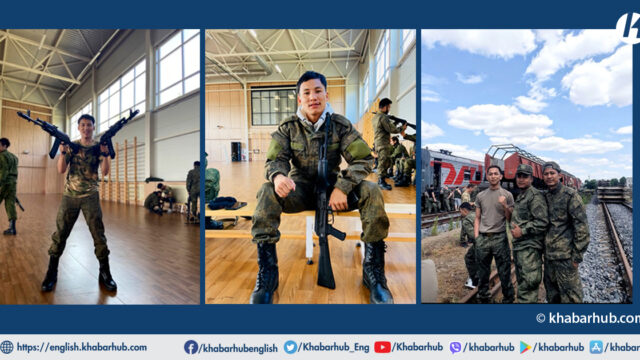
According to Khabarhub’s research conducted over the past few weeks, the precise number of Nepalese individuals serving in Russian mercenaries or the regular army remains uncertain.
However, through conversations held with Nepalese individuals enlisted in the Russian force, it has become apparent that a significant number of Nepalis have been recruited and are actively participating in combat on behalf of Russia in the war zone in Ukraine.
Through interviews with more than half a dozen Nepalis who have enlisted, it appears that Russia has escalated its recruitment campaign, specifically focusing on Nepalese individuals residing in foreign countries, particularly in the Middle East.
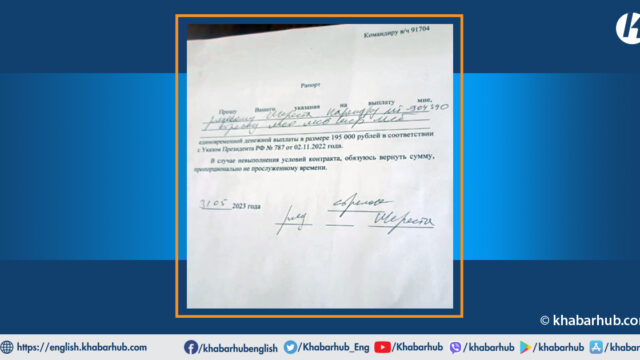
Khabarhub compiled this special report after conducting extensive research for several weeks, which involved various methodologies such as video analysis, monitoring of social media accounts, and direct conversations with numerous individuals, including those who have been recruited into these forces.
The research included evaluating a minimum of three dozen videos, closely monitoring relevant social media accounts, and engaging in direct discussions with over a dozen experts from Nepal, regional experts, and international experts.
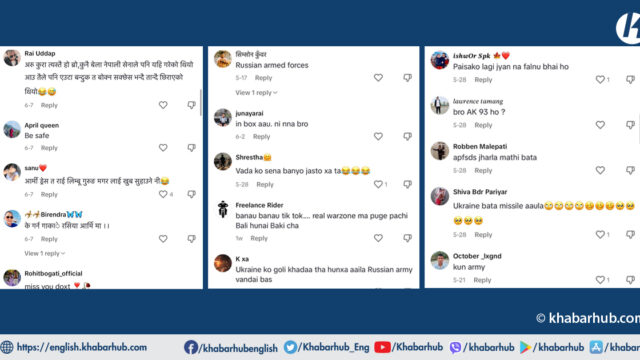
A Nepali citizen recruited by the Russian Army, who wishes to remain anonymous and is identified by his surname Magar and age 24, shared in a Telegram chat, “We, a group of nine Nepali citizens, have joined the Russian soldiers and are currently undergoing short-term training in Rostov Oblast, Russia.”
Magar added, “During our training, we are receiving the same provisions as other recruits provided by the Russian Defense Ministry. Upon completion of our training, we will be entitled to a monthly salary of up to $2500. Once our training is concluded, we will be deployed wherever the Russian Ministry of Defense deems necessary.”
He stated, “We are not in a private military company; we have joined the Russian regular army. Within a year, we will obtain Russian citizenship, and our family members will also benefit from this arrangement.”
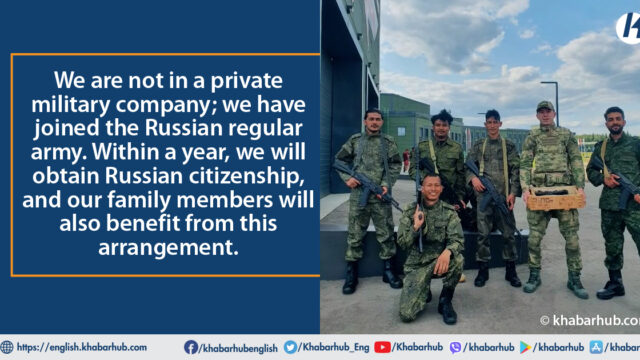
Another Nepali national Bishal Chettri stated, “I am joining a private contract as a soldier for one year, with the possibility of extending it until May 15, 2024. Currently, I am undergoing training and receiving a monthly salary of $500 for the first one and a half months. However, once I complete my training and arrive in Ukraine, my salary will increase significantly to $2400.”
A Nepali citizen, Anit Kumar, stated that he, along with three of his friends, arrived from Dubai, UAE, where they worked as security guards and earned a monthly salary of $500.
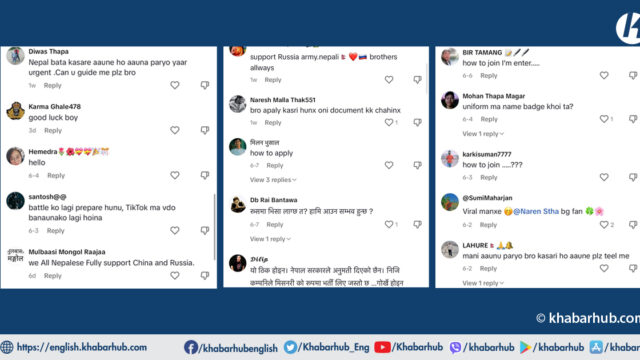
Although Anit did not provide further details, it is plausible that he and his companions were recruited by Wagner private military contractors (PMCs) operating in Dubai.
A young Nepali student named Narendra Shrestha, who joined the Russian private contract a few months ago, issued a warning to other Nepali citizens, advising them against attempting to join the Russian Army.
He mentioned that during the training session, there were six other Nepali individuals, all of whom were students before joining the army.
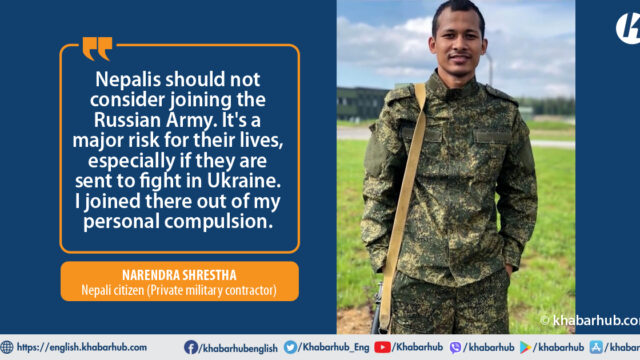
Shrestha, along with his six Nepali student friends, made the decision to join the Russian forces.
Narendra, driven by his desire to explore the world and find better opportunities, faced the challenge of his visa nearing expiration in just three months.
With long working hours in Russia, sometimes up to 10 hours a day, he struggled to save money.
Fearing the possibility of returning home empty-handed and being unable to secure a job or find other opportunities, he ultimately chose to join the army as his option.
After joining the Russian Army, undergoing training, and being deployed to the war zone in Ukraine, Narendra began to realize the immense hardships that awaited him.
In a sincere conversation with his fellow Nepali friends, he candidly shared his concerns and cautioned them about the inherent risks and challenges involved in joining the Russian Forces.
He expressed, “Nepalis should not entertain the idea of joining the Russian Army. It poses a significant risk to our lives, particularly if we are sent to fight in Ukraine.”
According to him, the language, food, and customs in Ukraine are vastly different from what Nepalis are accustomed to.

“I made the decision to join the army out of personal necessity, as my student visa was about to expire within three months, and I was left with no money. I had no other option at the time, but I urge you not to hastily rush into joining the army,” he stated.
Narendra’s plea carried significant weight as he foresaw the impending challenges ahead.
He was grappling with the language barrier and experiencing a sense of alienation from his familiar Nepali customs.
The difficulties he anticipated were not unfounded, and his concerns highlighted the potential hardships that awaited him in the unfamiliar environment.
Meanwhile, Foreign Minister NP Saud, Foreign Secretary Bharatraj Paudyal, and Spokesperson Sewa Lamsal declined to respond when approached by Khabarhub regarding this matter.
Reliable foreign affairs sources, meanwhile, said the Ministry has directed the Nepali Embassy in Moscow to gather information on the issue and the condition of the Nepali citizens affected by the situation and submit a report.
However, as of now, the Ministry has not received any updates from the Embassy.
In light of the ongoing development of Nepali citizens joining the Russian Army and mercenaries, retired Nepali Army (NA) General and former Chief of Army Staff, Rajendra Chhetri, voiced his concerns during a conversation with Khabarhub.
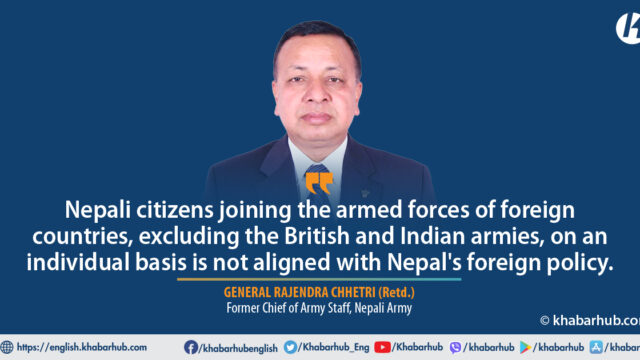
He emphasized that Nepali citizens joining the armed forces of foreign countries, excluding the British and Indian armies, on an individual basis is not aligned with Nepal’s foreign policy, which is based on nonalignment and the five principles of “Panchsheel.”
He further emphasized the need for the Nepal government to take measures to regulate such activities, as they could have serious implications for bilateral relations with friendly nations.
Former Prime Minister Sher Bahadur Deuba’s Foreign Affairs Adviser, Arun Kumar Subedi, vehemently denounced the recruitment process as illegal and in direct violation of the foreign policies of the Nepali government.
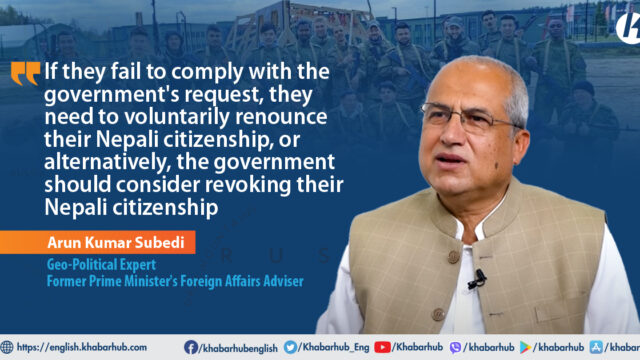
He emphasized the significance of adhering to the non-aggression pact signed between Nepal and other nations.
Subedi underscored the need for strict adherence to international agreements and norms in order to safeguard Nepal’s diplomatic relationships and maintain a principled stance in foreign affairs.
“According to the non-aggression pact signed between the Nepal government and the United Kingdom and India, it explicitly states that Nepali citizens are only allowed to serve in the armies of India and Britain,” Subedi stated.
He further said that the government should urge all Nepali citizens who have joined or are contemplating joining the Russian Army to immediately withdraw from their Russian military service.
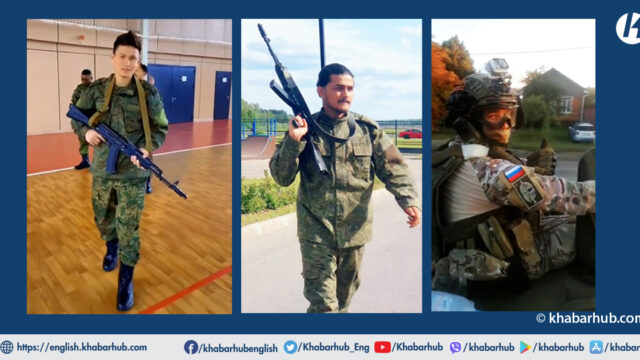
If they fail to comply with the government’s request, he suggested that they voluntarily renounce their Nepali citizenship, or alternatively, the government should consider revoking their Nepali citizenship.
Subedi emphasized that the government should express its commitment to taking swift action to address this matter and ensure the protection of the rights and citizenship of Nepali individuals involved in the Russian Army.
He reiterated the government’s dedication to handling the situation promptly and taking appropriate measures to safeguard the interests and well-being of Nepali citizens caught up in this issue.
The Nepali Embassy in Moscow issued an “urgent notice” to Nepali citizens on September 13, 2022.
The notice acknowledged that the embassy has become aware of the possibility of Nepali individuals joining Russian mercenaries in the aftermath of the Russian invasion of Ukraine.
This indicates that the embassy is actively monitoring the situation and providing relevant information to Nepali citizens to ensure their safety and well-being.
The embassy notice explicitly mentions that there has been a significant increase in the number of Nepalese students in Russia.

The notice contains a heartfelt appeal to all Nepali students and concerned parents, urging them to stay focused on their studies and resist any kind of temptation that deviates from their primary purpose while they are on a student visa in the Russian Federation.
The embassy also emphasizes the importance of prioritizing education and discourages engaging in any activities that may jeopardize their student status or future prospects.
“There has been a notable rise in the number of Nepalese students in Russia. We earnestly appeal to all Nepali students and parents concerned to resist any form of temptation apart from pursuing their studies while on a student visa in the Russian Federation,” it said.
However, it is important to highlight that the Nepali Embassy in Moscow fulfilled its formal obligation by issuing the notice.
It, however, did not provide any detailed reports, estimations, or further information about the situation of Nepali individuals involved in the Russian Army to Nepal’s Ministry of Foreign Affairs.
Furthermore, many of the Nepali individuals who communicated with Khabarhub stated that they were never contacted or contracted by the Nepali Embassy in Moscow regarding their involvement in the Russian Army.
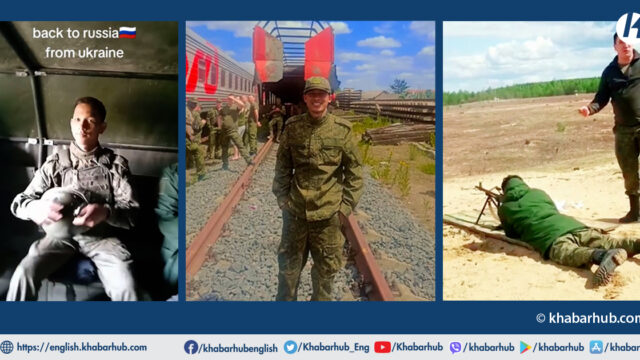
Following the war in Ukraine, neighboring countries of Russia, particularly Central Asian countries such as Uzbekistan, Tajikistan, Kyrgyzstan, and Kazakhstan, have repeatedly advised their citizens against joining the Russian Army.
These countries have recognized the potential risks and have taken steps to discourage their citizens from engaging in military activities outside of their national armed forces.
The governments of these countries have emphasized the importance of prioritizing national security and the well-being of their citizens by refraining from involvement in conflicts in foreign territories.
Khabarhub asked Jason M. Blazakis, a distinguished professor at the Middlebury Institute of International Studies.
Blazakis brings extensive expertise to the conversation, having served as the Director of the Counterterrorism Finance and Designations Office at the Bureau of Counterterrorism in the U.S. Department of State for 10 years.
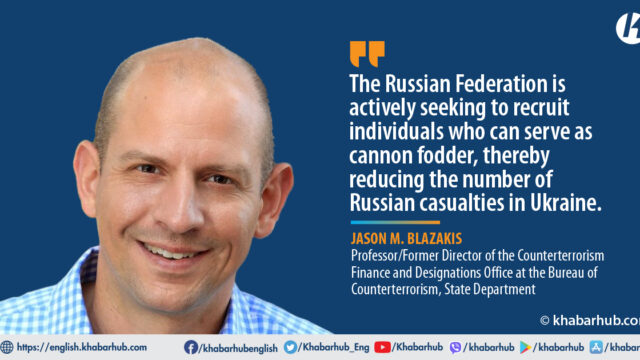
Due to his extensive research, writings, and public speaking engagements on the Russian invasion of Ukraine, Blazakis’s name has been included in the Russian Sanctions List.
In an interview with Khabarhub, Blazakis expressed his concerns, stating, “The Russian Federation is actively seeking to recruit individuals who can serve as cannon fodder, thereby reducing the number of Russian casualties in Ukraine.”
He added, “Regrettably, Russia is taking advantage of economically disadvantaged individuals to bolster its military forces. This approach is adopted because Russia is facing significant challenges in the ongoing war. While they may promise financial incentives for joining the fight, the harsh reality is that it often results in loss of life without any substantial gains. It is indeed a tragic situation.”
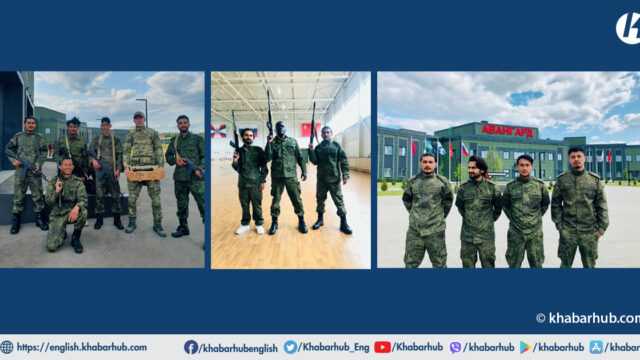
In addition to his previous statements, Blazakis further emphasized, “The Russian Federation’s recruitment efforts aim to secure cannon fodder to minimize Russian casualties in Ukraine. It is regrettable that Russia is exploiting economically disadvantaged individuals to strengthen its military forces.”
According to him, this strategy is primarily employed due to Russia’s poor performance in the ongoing war.
“While the promise of monetary compensation may be made, the ultimate outcome is often the loss of life without any substantial gains. This reality is truly tragic and deeply concerning,” he said.
One newly recruited Russian soldier, who was previously a Nepali student and prefers to be identified by his surname Bista, shared some insights.
Bista mentioned that he recently returned from a brief period of fighting in Ukraine and is currently on vacation, with plans to return to the combat zone soon.

Due to potential repercussions in Russia, Bista refrained from providing more specific details.
However, he did mention that his entire group underwent training near Belarus, and occasionally, Belarusian instructors would also participate in their training sessions.
Bista noted that alongside Nepali recruits, there were also individuals from African countries who underwent training and are now deployed in Ukraine.
During the interview, Khabarhub sought the insights of Victor Asal, a Professor of Political Science and International Affairs at Rockefeller College of Public Affairs and Policy, part of the University at Albany, New York.
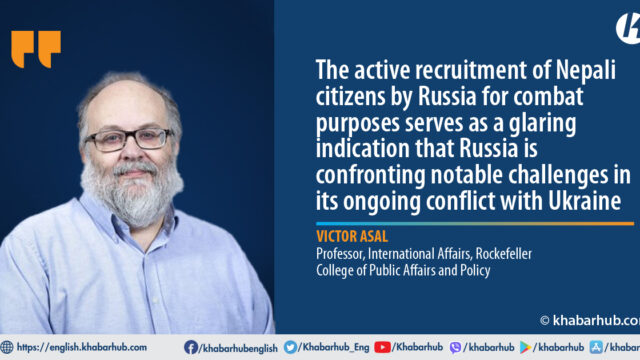
Asal expressed his perspective on the recent recruitment of Nepali citizens by Russia for the conflict in Ukraine.
He stated, “The Russian decision to actively recruit Nepali citizens for combat is a clear indication that Russia is facing significant challenges in the ongoing conflict with Ukraine. It suggests that Russia is encountering difficulties in recruiting sufficient numbers of its own citizens to participate in the conflict, hence the reliance on Nepali recruits.”
Khabarhub interviewed a retired Nepali Army soldier, who served for 20 years and requested to be referred to by his surname Rai.
Having recently joined the Russian army after residing in the UAE, Rai shared his thoughts on the notice issued by the Nepali Embassy in Moscow, urging citizens not to enlist in the Russian army.
Expressing his indifference towards the advice from the government and the embassy, he stated, “I find them irresponsible and hypocritical. Do they take any responsibility for me or my family? The answer is a simple ‘no’. It is up to me to strive for a better life for my family.”
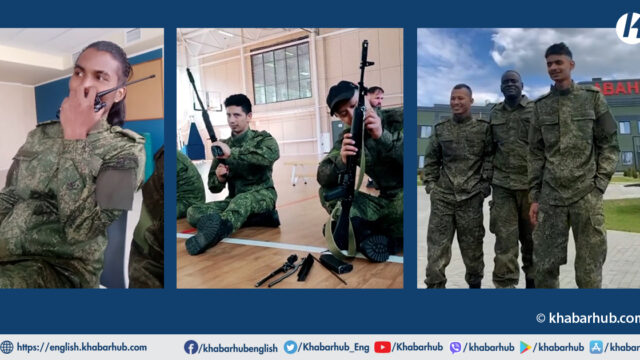
He added, “Previously, I worked as a security guard in the UAE, but I was deceived by agents, receiving an irregular monthly salary of only $400. Given my circumstances, I had no choice but to join the Russian Army in search of higher income. I am fully aware of the risks involved, but I am currently earning around $2,500.”
Rai further noted, “If I were to leave the army, would the Nepali government provide me with a job that offers the same salary? Will they offer me alternative opportunities or care for my family? The answer is once again ‘no’. They prioritize their own benefits and show no concern for anyone else. Their promises have not made the country livable.”
He further added, “If they had, why would I be seeking such risky opportunities? Unlike some of our corrupt retired Generals who enjoy luxurious trips to America, Europe, and Australia, I am solely focused on securing a better life for my family and children.”
Kamal Acharya, a recent addition to the Russian recruits, has gained considerable attention on social media platforms.

His Nepali social media account has attracted significant viewership and engagement. Nevertheless, his presence has sparked varied reactions within the online community.
Some young individuals express concerns about potential threats in Ukraine and strongly advise the recruits to return to Nepal promptly. On the other hand, there are also those who offer words of encouragement and support.
Dr. Deepak Prakash Bhatta, a prominent security expert, stresses the urgent need for addressing this matter.
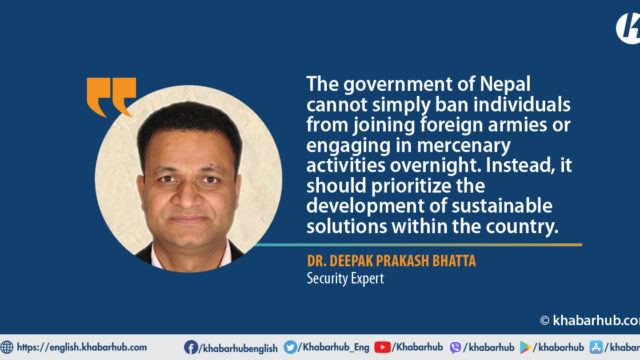
He highlights that the Nepali government cannot immediately prohibit individuals from joining foreign armies or working as mercenaries. Instead, he advocates for a focus on developing long-term solutions within the country.
This includes prioritizing the creation of employment opportunities, formulating national economic strategies, and taking measures to prevent the departure of Nepali youth, according to him.
Dr. Bhatta emphasizes the significance of engaging in comprehensive discussions involving all political parties and experts.
“Through such discussions, national strategies can be formulated to foster job creation and economic growth. It is crucial to set aside partisan tendencies and work together effectively in addressing these issues,” he noted.
By doing so, the country can work towards providing meaningful employment for its youth and strengthening its economy.
Khabarhub spoke with another recruit, who preferred to be referred to by the surname Sah, regarding the government’s call for Nepali citizens to register with the Nepali Embassy in Moscow.
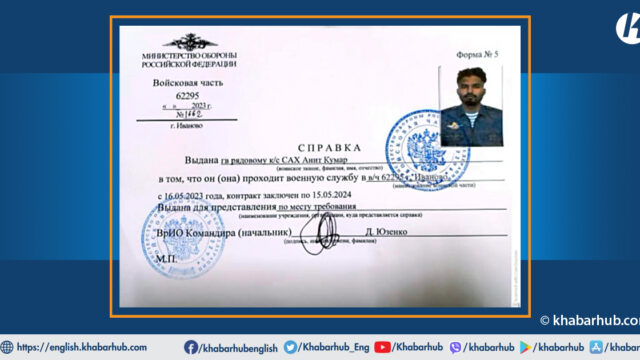
Sah expressed a disregard for the advice given by the government and the embassy, stating, “I don’t care about our irresponsible government or embassy’s advice. They don’t take any responsibility, neither for me as an individual nor for the nation’s overall survival.”
He added, “There are no job opportunities or conducive environment to support the well-being of my family in my country. I am not seeking entertainment; I am aware of the potential risks involved in this conflict, but I feel compelled to take this path due to lack of alternatives.”
Sah further added, “Will the Nepal Embassy provide us with jobs or take care of my family? No, they only prioritize their own financial interests. If they had truly made the country livable, why would we seek opportunities abroad? I don’t care about the government’s statements; my priority is the survival of my family. They are accountable for the consequences we face.”
A group of twelve Nepali security guards, predominantly comprising retired army soldiers, were provided assistance by a Russian agent operating from Dubai, United Arab Emirates (UAE).
This agent facilitated their travel arrangements, including Russian visas, flight tickets to Moscow, and local transportation to the military recruitment facilities situated near the Russian capital. The group availed these services on 4th of June.
One of the recruits, who preferred to remain anonymous, shared insights into their current situation.
He mentioned, “I am currently earning a monthly salary of 195,000 Russian Rubles, which is equivalent to $2,326. Given my previous military experience, my training lasted only a week. Unlike the Nepali Army, there were no age restrictions, educational qualifications, or physical tests such as push-ups or running. The recruitment process solely involved medical examinations.”
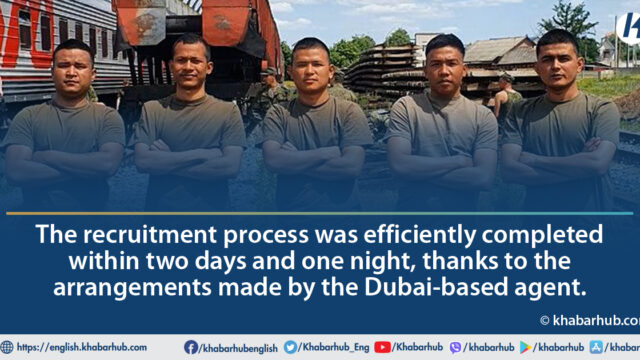
He further added, “My recruitment process was efficiently completed within two days and one night, thanks to the arrangements made by the Dubai-based agent. Currently, we have completed our basic pre-deployment training and are making preparations to depart for Ukraine in the coming days.”
Binoj Basnyat, a retired Nepali Army Major General and Geopolitical Strategic Analyst, emphasized the importance of the nation, parliament, and government being aware of the whereabouts and circumstances of their citizens both domestically and internationally.
He highlighted that while warfare is evolving with technology, human resources still play a crucial role and need to be physically present on the ground.
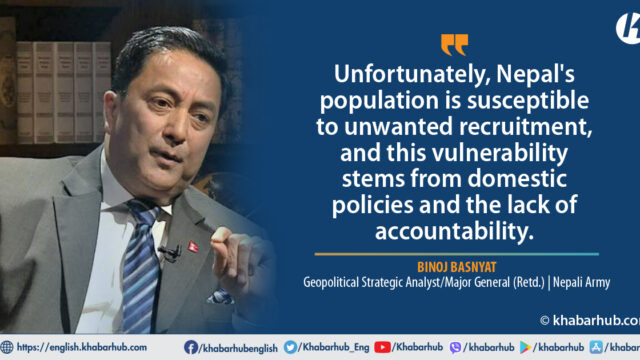
Basnyat expressed concern about Nepal’s population being vulnerable to unwanted recruitment, emphasizing that this situation arises from domestic policies and lack of accountability.
He underlined the need for the government to address these issues and take responsibility to safeguard its citizens from such vulnerabilities.
Basnyat further emphasized that the government should take immediate action and implement measures to prevent Nepali citizens from joining the Russian military forces.
He pointed out that such participation goes against Nepal’s foreign policy of neutrality and non-alignment.
Additionally, he highlighted the importance of ensuring the security and well-being of Nepali citizens, especially in a time when the international community is divided regarding global engagements but united in condemning Russia’s aggression in Ukraine.
Anit Sah, a resident of Moscow and a recent recruit in the Russian private military, has become a notable figure that has captured the attention of many.
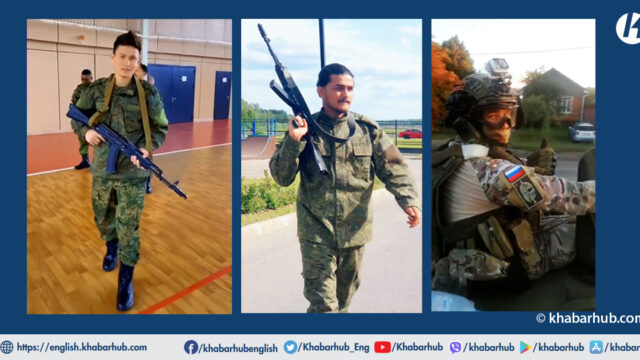
Through uploading videos of his training and showcasing the Russian army attire on social media, he has garnered significant popularity, particularly among Nepali viewers.
His videos have sparked curiosity among youth in Nepal and abroad, leading them to seek information about the recruitment process, salary details, and approaches to the recruitment center.
It appears that Sah’s social media account has become a channel through which Russian recruitment efforts are reaching Nepali citizens.
Despite our efforts to contact Anit Sah for additional information, we were unable to establish communication.
Nevertheless, it is evident that his social media presence has shed light on a concerning aspect: the Russian propaganda’s extensive recruitment campaign aimed at foreigners to participate in the conflict in Ukraine.
It is highly probable that the Russian military deliberately promotes the experiences and interests of these six Nepali social media accounts (not explicitly mentioned in this story) to attract Nepali youth towards joining the Russian forces.
This highlights the significance of understanding the influence and tactics used in such recruitment efforts.
European security and international relations expert, Victor Ramon Fernandes, who holds the position of Assistant Professor in International Relations at Universidade Lusíada in Lisbon, Portugal, expressed a similar concern.
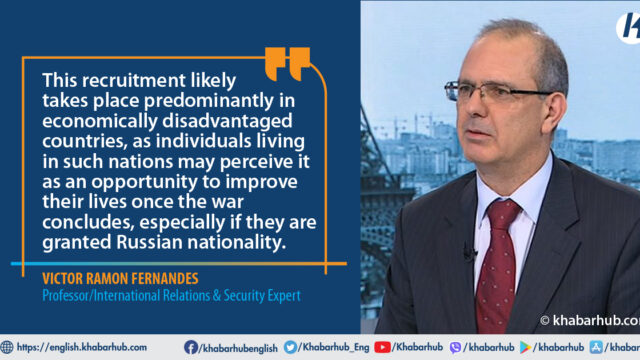
During a conversation with Khabarhub, he shared his views on the matter. Fernandes stated, “This type of recruitment is likely to predominantly target individuals from economically disadvantaged countries. It is often perceived as an opportunity for those living in such countries to improve their quality of life after the conflict, especially if they are granted Russian nationality.”
Meanwhile, Abhaya Raj Joshi, Executive Director of the Nepal Centre for Security Governance (NCSG), a think tank based in Kathmandu, expressed deep concern over the growing trend of Nepali youth joining the Russian army due to the limited job opportunities in Nepal.
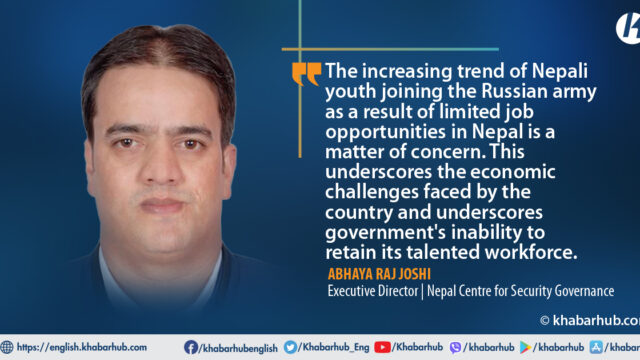
He emphasized that this issue not only reflects the economic challenges faced by the country but also underscores the government’s failure to generate employment opportunities and retain its talented individuals.
The situation highlights the need for urgent action to address the root causes of youth migration and unemployment in Nepal.
He further emphasized that this trend could have a detrimental impact on Nepal’s reputation, as it raises concerns about the country’s capacity to support its citizens and retain its workforce.
Joshi stressed the utmost importance for the government to take immediate action in addressing this issue by creating more job opportunities.
“By doing so, Nepal can mitigate the brain drain of talented youth to foreign countries and ensure a brighter future for its citizens,” he said.
A Nepali student currently residing in Moscow informed Khabarhub about the extensive advertising campaign for army recruitment that is taking place in various locations.
This campaign encompasses department stores, public places, streets, state TV, digital screens, billboards, and numerous media outlets in Russia.
Despite receiving multiple offers, the student declined due to personal reasons, such as restrictions from their family back in Nepal and concerns about the potential dangers involved in military service.
Furthermore, the student mentioned that even private Russian citizens, including department counter staff, are being approached and encouraged to join the army.
This indicates the widespread nature of the recruitment efforts and highlights the reach of the campaign beyond foreign nationals.
Why is Russia Losing the Ukraine War; How Did Manpower Shortage Arise?
On February 24, 2022, Russian President Vladimir Putin initiated a significant military operation by deploying approximately 200,000 soldiers into Ukraine, marking the beginning of a large-scale invasion with the aim of undermining the democratically elected government.
Since early 2021, the Russian military had been steadily building up its forces near Ukraine’s borders in Belarus and Crimea, triggering concerns from Ukraine’s crucial Western ally, the United States, regarding an impending Russian aggression. Despite these warnings, Putin consistently refuted such allegations.
The subsequent invasion marked the most extensive European military operation since the conclusion of World War II and was widely perceived as an unwarranted display of aggression by Russia.
In compliance with Putin’s directive, Russian troops swiftly pushed towards the outskirts of Ukraine’s capital, Kyiv.
However, they encountered formidable resistance from Ukrainian forces in their bid to seize control of Kyiv and other strategically significant cities.
Brad Nelson, President of the Center for World Conflict and Peace, in a conversation with Khabarhub said, “One of the primary reasons for Russia’s recruitment of foreign fighters, even before Ukraine’s major counteroffensive in September 2022, is due to the grueling nature of the war.”
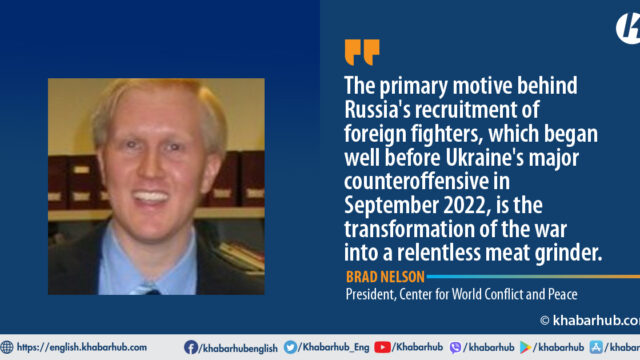
He noted that early engagement in foreign recruitment, as early as March 2022, indicates that Putin and Russian military leaders swiftly recognized the arduous and protracted nature of the conflict, understanding that coercing Ukraine into submission would not be easily achieved.
“The war has proven to be a bloody endeavor for Russia, with tens of thousands of troops lost and over a hundred thousand injured. The recent battle in Bakhmut was particularly devastating,” Nelson noted.
Furthermore, Russia’s mobilization efforts within its own borders have encountered significant challenges.
Russian conscripts have resorted to various means to avoid being deployed to Ukraine, including attempting to flee the country entirely, although such attempts have become increasingly difficult over the past six months or so, he stated.
The shortcomings of Russia’s military strategy and planning became glaringly apparent in the aftermath of the initial days of battle.
Their objective to swiftly capture Kyiv and overthrow the government of Volodymyr Zelenskyy, akin to their successful invasion and annexation of Crimea, ended in complete failure.
The escalating casualties and territorial losses highlighted Russia’s underestimation of the resilience and determination exhibited by Ukraine, ultimately transforming what was intended as a limited military operation into a full-fledged war between two sovereign nations.
Russia’s overconfidence led to a disregard for establishing proper logistics chains and engaging in long-term planning.
They erroneously assumed that the conflict in Ukraine would be swiftly resolved, similar to the scenario in Crimea where surrender and the fleeing of the president occurred, he stated.
This lack of foresight, coupled with flawed intelligence and a misunderstanding of Ukraine’s military capabilities, gradually drew Russia into an escalated and prolonged full-scale war.
The execution of the chain of command was marred by poor decision-making, revealing a dearth of military adaptability and accurate on-the-ground intelligence.
As a result, Russia struggled to seize and maintain control over crucial territories, leading to the dismissal or suspension of numerous senior military officials.
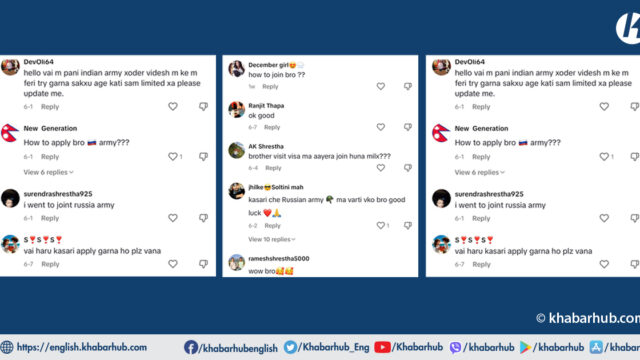
The frequent reshuffling of top operational commanders further impeded the effectiveness of their operations.
Adam Hunt, an expert closely monitoring the Russian recruitment drive, shared his observations in an interview with Khabarhub, stating, “I have noticed a more assertive strategy by the Russian Federation in targeting individuals from remote and economically disadvantaged regions, while allocating comparatively fewer resources towards recruiting from affluent urban areas.”
“This can be attributed, in part, to the fact that individuals with higher levels of education in Russia often hold a negative perception of the Russian armed forces,” he said.
According to him, as the war persisted, Ukraine’s resistance strengthened significantly, bolstered by growing military and intelligence assistance from their Western allies in opposition to Russia.
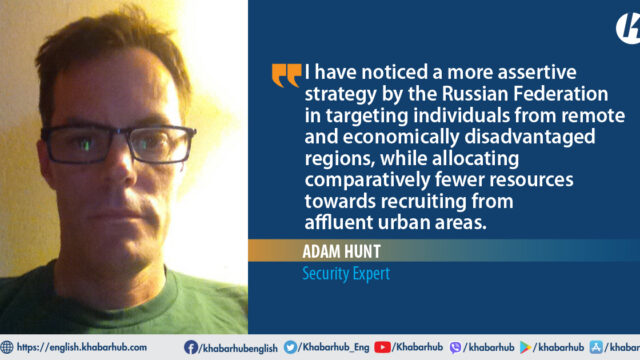
Consequently, the conflict gradually evolved into a large-scale conventional war for Russia, prompting the need for extensive preparations to sustain an extended campaign, particularly in terms of ensuring soldier readiness and overall military preparedness.
The significant outflow of young Russian men seeking refuge in other countries created a pressing need for Russia to safeguard its field commanders and secure troop movements within Ukraine.
The queues of vehicles extended for kilometers along Russia’s eastern, southern, and western borders, predominantly consisting of men of conscription age, during the fourth week of September 2022.
In response, Ukraine actively bolstered its intelligence capabilities and established robust information-sharing channels with the United States and NATO.
This heightened intelligence cooperation rendered Russia more susceptible to detection and hindered their ability to carry out military maneuvers with ease.
Blazakis meanwhile remarked, “Russia entices individuals with the promise of substantial financial rewards for a limited duration of service.”
Tragically, many who accept Russia’s offer meet their demise before they can benefit from any of the promised money. Russia specifically targets vulnerable individuals, seeking out those who possess some degree of prior combat experience, he shared.
“These individuals often find themselves on the front lines, engaging in trench warfare reminiscent of World War I. The conditions are brutal and harrowing. Essentially, Russia manipulates people into fighting on their behalf,” noted he.
Following the significant loss of soldiers in the Ukrainian war, the Russian government launched several army recruitment drives, which included an extensive advertising campaign encouraging citizens to enlist in the military.
However, the intended outcomes of these efforts have thus far proven elusive and unattainable.
The escalation of the conflict compelled thousands of Russians to flee their country in an attempt to avoid potential military conscription.
Since early 2021, the Russian military had been gathering near Ukraine’s borders in Belarus and Crimea, triggering alerts from Ukraine’s crucial Western ally, the United States, regarding the imminent possibility of Russian aggression. Despite repeated denials from Putin, these claims persisted.
The Russian military’s erroneous assumptions and miscalculations resulted in critical military setbacks and a notable scarcity of manpower.
Following several months of all-out aggression against Ukraine, Russia endured substantial casualties, with tens of thousands of soldiers killed or wounded.
Confronted with the challenges posed by manpower shortages and the exorbitant cost of engagements in Ukraine, Russia implemented various recruitment strategies to sustain its military campaign.
In a televised address, President Putin declared a partial mobilization, summoning approximately 300,000 military reservists and appealing for civilian assistance to alleviate Russia’s acute shortage of manpower.
Consequently, a considerable number of Russians sought to evade conscription by attempting to flee the country through land borders into neighboring nations like Georgia, Kazakhstan, and Mongolia.
The queues of vehicles extended for kilometers along Russia’s eastern, southern, and western borders, predominantly consisting of men of conscription age, during the fourth week of September 2022.
Harsha Kakar, a retired Major General of the Indian Army and analyst emphasized, “The ongoing war is inflicting a substantial loss of life in both involved nations. Given the hesitancy of regular armed forces to engage directly, both sides are increasingly resorting to the utilization of mercenaries.”
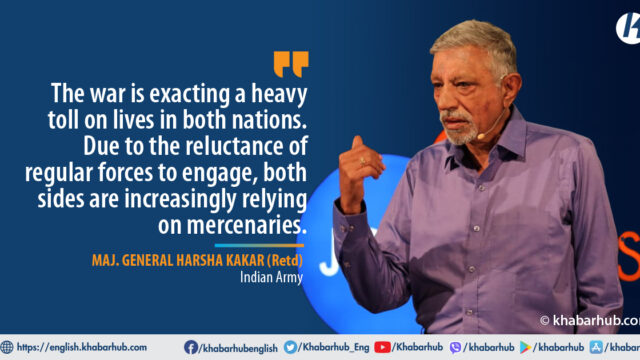
He added, “Mercenaries offer a cost-effective alternative as they require minimal training and demand lower wages. Furthermore, the nations supplying these mercenaries often lack precise information regarding their numbers. Consequently, casualties among mercenaries frequently go unreported, with limited or no official records available.”
According to him, Russia has encountered difficulties in recruitment due to the substantial casualties suffered during the conflict in Ukraine.
“To address the personnel shortages, Russia has adopted a strategy of seeking assistance from foreign sources,” he explained.
This includes recruiting personnel from private security companies and providing incentives such as bonuses to conscripts.
Additionally, Russian forces have turned to recruiting “mercenaries” from various regions, extending from Syria to Africa, to provide support during the invasion of Ukraine.
“Mercenaries are typically recruited through local contractors who offer meager payments during the recruitment phase and promise the remaining amount upon death or return, which may not always materialize,” noted Kakar.
He further explained that individuals facing poverty may find the risk associated with such opportunities worth taking, making it an appealing option. This approach has also been observed in practice by other countries.
Rise of Private Military Companies in Russia: Exploring Expansion with Foreign Recruitment
In the aftermath of the Russian military’s conventional loss in the war in Ukraine, the Russian government has progressively turned to private military companies (PMCs) as a means to achieve its military objectives.
Apart from the well-known Wagner Group, there are multiple other private military contractors in Russia that serve the interests of the Russian military and pursue strategic objectives.
These PMCs include E.N.O.T. Corp., Patriot, Redut, Slavonic Corps, and several others. One of their primary focuses is actively recruiting foreign individuals to supplement their forces.

According to Blazkis, Russia actively seeks to recruit foreigners from various locations, both within Russia’s territory and abroad.
Russia has been known to directly engage in recruitment efforts in countries such as Afghanistan, Syria, Serbia, and numerous other locations.
On September 20, 2022, the Russian State Duma passed the second and third amendments to legislation aimed at streamlining the acquisition of Russian citizenship for foreign individuals who enter into a contract for a minimum period of one year of service in the Russian Armed Forces.
Previously, foreigners were required to serve for five years before becoming eligible for citizenship.
It is worth noting that foreign citizens enlisting in military service are restricted to the ranks of soldier, sailor, sergeant, and sergeant major, with no possibility of attaining higher officer positions.
On May 15, 2023, Russian President Vladimir Putin issued a decree that introduced an expedited process for granting citizenship to foreigners employed under contract in the Russian Armed Forces.
The decree specifically outlines the eligibility criteria as “foreign citizens who have signed contracts for military service in the Armed Forces of the Russian Federation or military formations for a duration of one year, along with their families.”
Operating independently, Wagner maintains a distinct and sometimes tense relationship with Russia’s regular military. The autonomous nature of Wagner often results in the rivalry between the two entities.
This decree encompasses private military contractors as well, indicating that they are not exempt from the provisions set forth by Putin’s order.
Brad Nelson, President of the Center for World Conflict and Peace, shared his perspective with Khabarhub, stating, “I don’t consider foreign fighters to be a decisive factor for Russia. Instead, they serve to sustain Russia’s presence in the war, ensuring that, at least for the time being, there are enough personnel to maintain competitiveness on the battlefield.”
He further remarked, “In fact, introducing more fighters, whether from within Russia or abroad, into an already chaotic Russian military campaign does not address the underlying issues responsible for Russia’s failures in the war. These issues include inadequate military strategy, insufficient allocation of resources to the front lines, logistical challenges, low morale among the forces, and other related factors.”
A Nepali individual, Sangeet Tamang, who was recently recruited as a Russian private mercenary, has been actively sharing videos on social media, providing glimpses into his training experiences within Russian training barracks.
He has even showcased his proficiency in operating small drones, handling communication systems, and occasionally demonstrated the use of light weapons.
Tamang’s uploaded videos have garnered significant viewership, particularly among Nepali audiences, leading to numerous queries in the comment sections regarding how to join the Russian army.
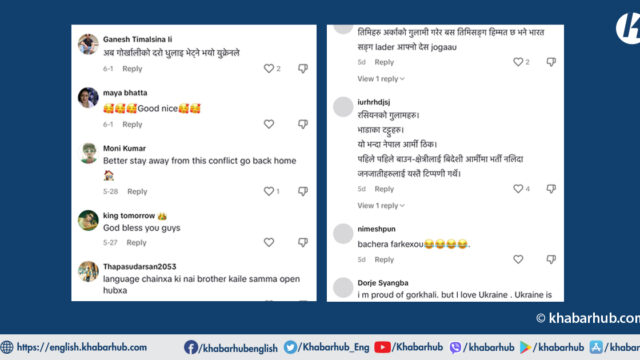
Additionally, Tamang’s social media posts have featured images of up to 10 Nepali citizens undergoing training in an unidentified Russian training base.
Despite attempts by Khabarhub to contact him through his social media account, no successful communication has been established thus far.
Meanwhile, the Wagner Group has gained significant attention for its participation in multiple conflicts, acting as a formidable instrument in President Putin’s endeavors to counter Western influence.
Wagner mercenaries have been actively involved in combat operations in various countries, including Ukraine, Syria, Libya, Sudan, the Central African Republic, Mozambique, and Madagascar, among others.
According to the Center for Strategic and International Studies (CSIS), a policy research organization based in the United States, Russian PMCs believed to be linked to Russian operations have been detected in up to 30 countries across Europe, the Middle East, Africa, and Latin America.
In 2022, the Wagner Group officially registered as a private military company in Saint Petersburg, Russia.
Operating independently, Wagner maintains a distinct and sometimes tense relationship with Russia’s regular military. The autonomous nature of Wagner often results in the rivalry between the two entities.
The Russian Defense Ministry has issued a directive requiring all “volunteer formations” in Ukraine to sign contracts with the Ministry by the end of June.
However, the chief of Wagner has consistently declined to sign these contracts and publicly declared their intention to boycott them.
The US National Security Council has reported that approximately 80% of Wagner’s personnel are deployed in Ukraine.
The UK Ministry of Defense has also acknowledged that Wagner is estimated to command a substantial force of around 50,000 fighters in Ukraine, making them a significant presence in the ongoing conflict.
In a conversation with Khabarhub, Nelson highlighted the role of the Wagner Group in addressing the shortage of personnel caused by casualties in Ukraine.
He stated that the Wagner Group has deployed its own mercenaries to Ukraine and has also assisted with recruitment efforts, both within Russia and abroad. The “Wagner Group has utilized its connections with various shadowy, militant, and criminal groups across regions such as Latin America, the Middle East, Africa, Eastern Europe, and South Asia to bolster its ranks,” Nelson stated.
Importantly, Nelson emphasized that foreign recruitment is primarily conducted by the Wagner Group itself, rather than being directly orchestrated by the Russian state or military.
Meanwhile, according to Blazakis, the strategy employed by Russia has not yielded successful results.
Despite their ongoing aggression against Ukraine, Russia continues to struggle in the conflict.
Blazakis further asserts that the Russian military and senior leadership have demonstrated incompetence in their handling of the situation.
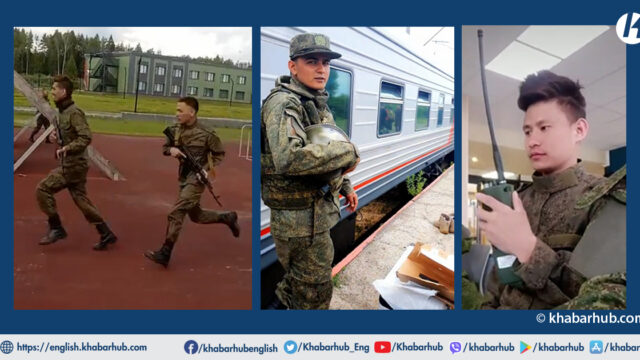
In February 2014, Russia annexed Ukraine’s Crimean Peninsula following the downfall of the pro-Russian regime in the wake of the Euromaidan Revolution, which led to the ousting of President Viktor Yanukovych.
Subsequently, Russia expanded its influence by initiating a separatist campaign in Russian-speaking Eastern Ukraine, with the intention of undermining Ukraine’s economy and heavy industries.
Pro-Russian separatist militias, acting as proxies for Russia, specifically targeted the industrial center of the Donbas region, showcasing Moscow’s desire to gain control over the major eastern regions of Luhansk and Donetsk.
During the ongoing crisis in Ukraine, on January 2, 2015, Russian President Vladimir Putin issued a decree that opened up the opportunity for foreign citizens to enlist in the country’s Armed Forces.
The decree outlined that individuals from abroad, aged 18 to 30, could enter into five-year service contracts with the Russian armed forces, potentially leading to the acquisition of Russian citizenship.
Eligibility requirements for foreign nationals included proficiency in the Russian language and a clean criminal record.
Nepal’s Denounces Russian Invasion of Ukraine; Many See as Nepal’s Foreign Policy Shift
Since the Russian invasion of Ukraine, Nepal has consistently demonstrated proactive support for Ukraine and condemned the invasion from its onset.
Nepal has been vocal in urging Russia to withdraw all military forces unconditionally and actively advocates for a peaceful resolution to the conflict.
On February 24, 2022, Nepal’s Ministry of Foreign Affairs released a strong statement expressing its protest against Russia’s use of force in Ukraine.
The statement highlighted Nepal’s firm belief in upholding the provisions of the UN Charter and reiterated its support for the territorial integrity of Ukraine.
“Nepal unequivocally opposes any act of aggression or use of force against a sovereign nation, the statement said.
Maintaining its steadfast support, Nepal once again demonstrated its solidarity by voting in favor of a non-binding resolution at the United Nations on February 23, 2023, which strongly condemned Russia’s invasion of Ukraine.
Nepal actively participated in an emergency Special General Assembly convened at the UN Headquarters in New York and cast its vote in support of the resolution.
The resolution called for the restoration of peace in Ukraine and garnered widespread international support, with 141 nations out of 193 UN member countries backing it. Meanwhile, 32 countries chose to abstain.
Notably, seven countries, including Belarus, North Korea, Eritrea, Mali, Nicaragua, Syria, and Russia, voted against the resolution.
The approval of the resolution by the UN General Assembly coincided with the first anniversary of the invasion, underscoring the international community’s commitment to addressing the ongoing crisis.
The stance of Nepal regarding the Russian invasion of Ukraine has sparked considerable debate within the country’s foreign affairs landscape.
Traditionally, Nepal’s foreign policy has been centered around maintaining neutrality in bilateral and multilateral matters.
However, the nation’s support for Ukraine has led to speculation about a potential shift in its foreign policy approach.
The decision to express solidarity with Ukraine raises questions about Nepal’s evolving stance on global conflicts and its commitment to upholding principles of peace and international norms.
According to Subedi, foreign affairs advisor to former Prime Minister Sher Bahadur Deuba, there is a need for Nepal to consider a shift in its foreign policy.
However, it raises questions about whether Nepal’s foreign policy has undergone a significant reorientation as its immediate neighbors, China and India, have expressed a less resolute stance on the Russia-Ukraine conflict, according to him.
Subedi advocates for closer ties with democratic nations, the diaspora, and donor countries, emphasizing the importance of prioritizing Nepal’s own interests.
He suggests that Nepal should move away from traditional foreign policy approaches and align itself with countries that offer mutual benefits.
“This proposed shift would involve a more proactive engagement with nations that can contribute to Nepal’s development and well-being,” he said.
Subedi’s perspective highlights the evolving discussions within Nepal’s foreign policy circles and the ongoing dialogue about potentially redefining the country’s international relationships based on its own strategic interests.
On March 10, 2022, Nepal demonstrated its stance against the Russian invasion of Ukraine by voting in favor of a resolution at the United Nations General Assembly.
The resolution called for the immediate, complete, and unconditional withdrawal of all Russian military forces from Ukrainian territory.
Nepal’s decision to vote against Russia was viewed by some as a departure from its longstanding policy of non-alignment, which it had adhered to for many years.
This vote highlighted Nepal’s willingness to take a clear position on global issues and show solidarity with Ukraine in condemning the invasion, according to Subedi.
It also sparked discussions about a potential shift in Nepal’s foreign policy approach and the evolving dynamics in its international relationships.
After the United Nations vote on the Ukraine war, US Secretary of State Antony Blinken had a conversation with Prime Minister Sher Bahadur Deuba, expressing appreciation for the Nepalese government’s decisions to endorse both the Millennium Challenge Corporation (MCC) and the UN resolution.
The endorsement of the MCC, a bilateral partnership focused on economic development, and the support for the UN resolution demonstrated Nepal’s commitment to international cooperation and shared values.
Secretary Blinken’s expression of gratitude highlighted the positive impact of Nepal’s decisions on strengthening the bilateral relationship between Nepal and the United States.
According to Sanjay Upadhyaya, an expert on Nepal’s politics and foreign policy, Nepal’s firm stance against Russian aggression in Ukraine has brought the country closer to Western democracies.
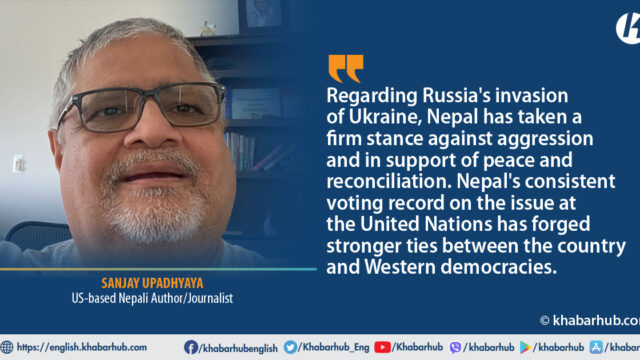
“Nepal’s consistent voting record at the United Nations on this issue reflects its commitment to peace and reconciliation,” Upadhyaya said.
As a recently established federal democratic republic, Nepal’s position aligns with its own democratic principles, he added.
However, it raises questions about whether Nepal’s foreign policy has undergone a significant reorientation as its immediate neighbors, China and India, have expressed a less resolute stance on the Russia-Ukraine conflict, according to him.
The impact of the Russian invasion on Nepal’s overall foreign policy direction remains a topic of analysis and interpretation.
Upadhyaya said Nepal faces challenges in consistently opposing the positions taken by its neighbors, China and India, on international matters.
While Nepal’s stance on Ukraine aligns more with the interests and values of Western countries, it may not necessarily antagonize China and India.
Upadhyaya suggests that Nepal’s position on Ukraine is part of a larger process of evolving dynamics in the international system.
It indicates that Nepal’s foreign policy is influenced by a range of factors and trade-offs, rather than being solely oriented towards the West. The balancing act Nepal engages in highlights the need for careful calibration and consideration of various issues in its foreign policy approach.
Critics, particularly from the left bloc with pro-Chinese leanings, have voiced concerns about the government’s ability to effectively conduct foreign policy, citing deep political divisions on key international issues.
However, the current coalition government comprising the Nepali Congress, Maoist Center, and Madesh-based parties, maintains a consistent position on Ukraine.
Scholars of international relations in Nepal hold divergent opinions on this matter. Some argue that maintaining permanent neutrality is the optimal approach to safeguard Nepal’s interests.
They believe that by avoiding alignment with any specific bloc or country, Nepal can protect its sovereignty and maintain a balanced position in global affairs. On the contrary, there are those who advocate for forging closer ties with democratic countries.

They emphasize the potential benefits of aligning with nations that share similar values, promoting democratic governance, and fostering economic cooperation.
However, there are also scholars who advocate for a pragmatic and non-aligned approach to Nepal’s foreign policy.
They suggest that Nepal should carefully evaluate each international issue based on its own merits and prioritize its national interests.
This approach seeks to maintain autonomy and flexibility while engaging with various countries and pursuing mutually beneficial relationships.
Nepal’s economic development is significantly supported by foreign aid, grants, and loans, with a substantial portion originating from Western countries.
International institutions such as the World Bank, the International Monetary Fund (IMF), and the Asian Development Bank (ADB), along with nations like the United States, India, Japan, and the European Union, have played crucial roles in funding numerous infrastructure projects in Nepal.
However, Nepal’s unpredictable political landscape, marked by frequent changes in governments and disagreements on foreign policy matters, poses challenges in formulating a unified foreign policy agenda and achieving consensus on foreign policy priorities.


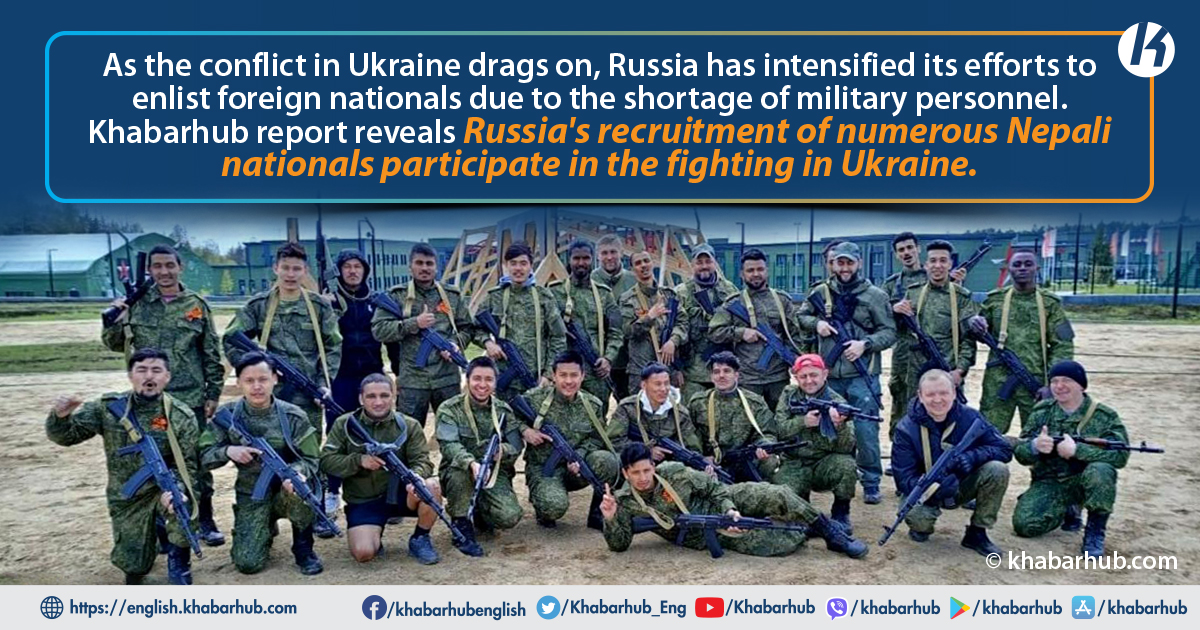






Comment